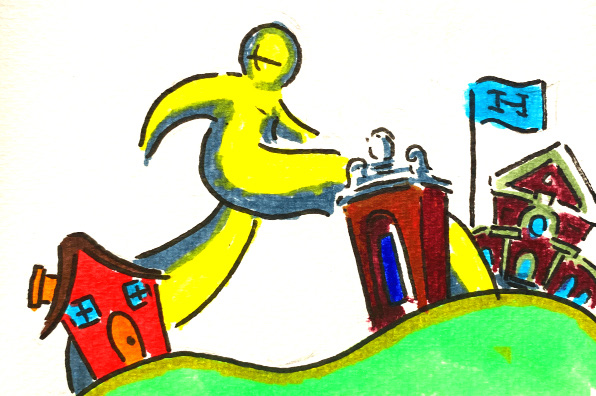One of the most prevalent problems in the United States school system is the lack of sleep. According to Nationwide Children’s Hospital website, the average teenager gets about 7 hours of sleep, and with the heightened course loads and extracurricular commitments undertaken by Hotchkiss students, we can only assume this problem exists at Hotchkiss.
While the school has tried through a variety of ways to combat bad sleeping habits, these have been largely ineffective. It is a well known fact that insufficient sleep can cause numerous health issues and can impede school performance; this is a problem that needs to be fixed. I believe that Hotchkiss has approached the problem the wrong way: instead of trying to get students to bed earlier, the school should simply let them get up later.
As part of the hormonal changes which accompany teenage years, our bodies release melatonin later in the night than small children and adults. Melatonin is a hormone naturally produced by our brains that assists sleeping. When we become teenagers, our internal clocks shift, and our bodies release melatonin two hours later, at around 11:30 p.m. From this simple research, we can conclude that teenagers don’t choose to go to bed late, they more or less have to.
Besides the biological reasons for students going to bed late, the excessive amounts of homework and tests make it difficult to balance the social, academic, and athletic lives of students, especially at a school like Hotchkiss. For these reasons, researchers show that a reasonable time to expect teenagers to be in bed is from 11:30 p.m. to midnight. Attempting to combat the natural sleep cycle of teenagers is doomed to fail.
The current Hotchkiss schedule begins at 8:30 a.m. most days, and 8:50 on Wednesday. To properly get ready for the school day, students need to wake up around 7:50 a.m. so that they can get breakfast, shower, etc. According to one study, most teens go to bed from 11:30 p.m. to 1 a.m., which means that the average Hotchkiss student will get 7 to 8.5 hours of sleep.
According to John Hopkins pediatrician Michael Crocetti, teens need about 9 to 9.5 hours of sleep a night to function at their best. When teenagers fail to reach that target, it can lead to slowed thinking, lack of energy, increased chances of depression, obesity, cardiovascular problems, and many more serious medical issues.
Clearly, the system in place at Hotchkiss doesn’t allow students to reach an ideal, healthy amount of sleep while being consistent with their natural sleep cycles. If the school wants to promote healthy sleeping habits, the only logical solution is to push back the start of the school day.
In order to fit its students’ sleep schedules, Hotchkiss would only have to push the start of the day by about half an hour. This would allow the average student to get nine hours of sleep and make it to class on time. Of course, some responsibility will be left to students to actually go to bed when their bodies tells them to. Moving the school day forward by 30 minutes isn’t a big sacrifice to make. There are a number of ways we could achieve this: make classes five minutes shorter, have school end a bit later, or shorten our lunch times.
The results of this small sacrifice will allow students to go to bed when their bodies tells them to, while still achieving their recommended amount of sleep, spending more time on homework and socialization, and performing better in school. Why not have school start just a bit later?





